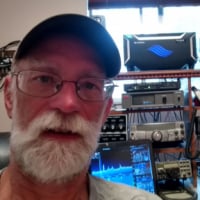SmartSDR v4.1.5 | SmartSDR v4.1.5 Release Notes
SmartSDR v3.10.15 | SmartSDR v3.10.15 Release Notes
The latest 4O3A Genius Product Software and Firmware
Need technical support from FlexRadio? It's as simple as Creating a HelpDesk ticket.
Home Network and FLEX-6400
Hello dear friends. I still love my Flex-6400 radio.
We had a lengthy outage on our internet from Xfinity and when I tried to use my FLEX-6400 which is on my home network. The radio would not appear on the computer using SDR-Smart software. The software kept giving me error messages that the radio is unavailable. I like the idea of the radio on my home network and the ability to go online for logging or looking at QRZd.........Is the 6400 dependent on the internet to be operational? Does it check into a server to "allow" it work? Good thing I kept my analog radio. Really disappointed that it would not work. Maybe a setting in the router? Something doesn't make sense here. Can I connect the 6400 to the computer direct; using the ethernet ports; to avoid this from happening again?
thanks Fred KC4MOP
Best Answers
-
I leave my radio and computer on 24/7/365. My shack is in a closed downstairs bedroom and not a dusty environment now 5 years.
A significant improvement has been when I installed a switch (Gs108 as I recall) simple non managed switch. Only radio, computer, PGXL, Tuner Genius are plugged into the switch. The switch is then connected to the router. Thus all radio data communication messages are within the switch network directly, 1 ms Latency. If the router goes down my radio still works as normal . Comcast is the most unreliable part of the system with the power company being a close second. Comcast is no different than any other internet provider in my opinion. Internet service is basically complex .
If you get a momentary power interruption or event that drops the router and it reboots it takes minutes to get back on line without the switch. To hep make my setup more dependable I got a UPS and connected the switch, Comcast router, monitors and computer. It was $150 but was worth the backup.
I do have 12 v dc batteries for home brew UPS for the radio but have not got around to hooking it up so the Flex does not reboot if I lose power.
For my operation 24/7 I found DAX bug requires me to click the TX button off then on every three days to prevent TX audio corruption.
I do operate local remote around the house with my laptop at times that is nice. I have operated remote on vacation that is not popular with my wife.
What ever your configuration I would think Reliability. Before I worked on the above items when something crashed I never knew what was going on. Now I have found things seldom crash and it if so what caused it is easier to analyze.
73
Bill W9JJB
0 -
The best thing to do is to set up any critical equipment with static IP addresses. This is very easy to do and will save you a lot of headaches.
0
Answers
-
Hi Fred, the Flex does not need internet access to operate. What is most likely happening is the assignment of IP Addresses.
Your router assigns addresses using something called Dynamic Host Configuration Protocol (DHCP). Depending on how your router is set up, it will assign IP addresses to your devices (like your Flex and computer). Addresses can be reserved by the router so that it gives the same address to a particular device each time it starts up. This is the easiest and most desirable way to operate under most circumstances.
While you are sorting that issue out, you can directly plug your computer into the Flex using ethernet cable. The radio and computer will both have to be re-started, but SmartSDR will find the radio, and you will be able to operate normally. We often call this "Field Day" mode as it is how most Flex 6000 radios are operated when away from the internet.
There are some good videos on connecting your Flex to your network, including router settings. I will see if I can find them and will post a link or two back here. If all that does not help, I would suggest submitting a help desk ticket. The Flex folks have long experience getting network issues resolved.
0 -
Thanks Len
Your hopeful links will help greatly. I agree about possibly assigning static addresses to these 2 devices in router.
Standing-by...no rush
Thanks
Fred
0 -
0
-
Wonderful
Thanks. Knowledge is simply wonderful.
Thanks Len
Fred
0 -
hi Len,
Thanks for the tutorials. What always seems puzzling with IT stuff gets sorted out with easy-to-understand videos.
In regards to this connectivity problem; an I T friend of mine verified that if I lose internet THEN the router will not be able to assign ip addresses. Something about DHCP. I'll ask him to explain what he did to work around that. Maybe a router setting in regards to DHCP......or the router creates DHCP........I'm getting cloudy brain now.
As an aside; I leave my FLex6400 on 24/7. I noticed with the blue lights on the panel that there is a large muffin fan slowly turning blowing air on the main deck where the PCBs are located. My experience tells me that it will turn into a maintenance thing with dust gathering and clogging things up for air circulation. Is there any shortcomings to leaving the unit on 24/7. That old adage of off-on cycling of electronics.
Thanks.........Fred
1 -
Glad you got it working Fred. I don't have any hard data one way or the other on leaving the radio on 24/7. I tend to leave mine on all day instead of cycling it on and off. At night I usually power it down completely, including the power supply. I am looking for the middle ground - no excessive power cycling, but shut it down if not using it for a while. I don't think it makes a whole lot of difference either way.
There are lots of folks who leave their Flex running 24/7/365, especially those whose radios are at inaccessible remote sites. There are also a lot of folks who only leave them powered up while using them.
Do what you are comfortable with, you won't hurt the radio.
0 -
BINGO!!!!!!!!
I would have never thought of that solution!! Thanks Bill......Thank You.
I do have a 1gB switch (Netgear?) brand new in a box and I'll be connecting that to the computer and Flex THEN the switch looks back to the Router for internet stuff.
I have a 2000Watt Liebert online UPS on all of the flakey internet gadgets. Modem,router, and 7 computers, and another switch on my home network. I guess I should include the FLEX / Astron P.S. to the UPS to smooth out the bumps. I have a bank of 6 gel cell batteries (I forget the actual number) to give me 50VDC to the Liebert to keep life going for 5 hrs. The UPS is backing up my audio studio where I have a live music show on an internet radio station. (FAKE Radio) REAL radio is a big box with TUBES and needs 220VAC and a radio tower.
I AM looking at YOUTUBE vids for the Flex radio suite and the DAX looks interesting. Guessing it's digital pipeline. Converting analog to digital and then digital to analog is cumbersome!
.............73 Bill
Fred KC4MOP
0 -
Actually, you are converting RF to Digital (we bypass analog) and then Digital to Digital for the Soundcard modes and we sample it at 24bits. Much better. Your audio stays in the digital domain for the entire trip.
And, less RFI issues.
0 -
UPDATE and Thanks
Re-designed and re-worked LAN. FLEX radio and the 2 computers in shack on a switch direct shot to the router.
Moved Flex Astron P.S. and both computers and switch P.S., to my 2000W U.P.S.
Powered and connected all devices; then turned on switch. THEN I connected Cat5 from Router to switch. All devices saw each other. I disconnected the router from switch and all devices continued to see each other and computer running Smart SDR had access to Flex radio**.
Installing common mode clip-on modules, as I saw on a Youtube vid from Dan to keep possible QRO RF messing up data lines.
**When I first powered up the 2 computers and FLex radio the computer using Smart-SDR did not access Flex6400. AFTER I connected to the router everything worked.
Fred KC4MOP
0 -
It sounds like the client(s) and radios were on different subnets.
0 -
"Powered and connected all devices; then turned on switch. THEN I connected Cat5 from Router to switch. All devices saw each other. I disconnected the router from switch and all devices continued to see each other and computer running Smart SDR had access to Flex radio**."
I think you will have faster radio startup, and more reliable results overall by starting the already connected router (which provides DHCP) AND the switch BEFORE starting the computer and the radio.
Think of the switch and router as being resources that the computer and 6400 need to function correctly. Even though the 6400 supports direct connection to the computer using "link-local" addressing, it is not the optimal way to do things. It is really meant for direct radio to computer type operation without any other network connectivity by the computer or radio to a wider network.
0 -
Yes you are correct Duane.
The original thought in this thread was from a situation where I lost Comcast service from a major outage And I could not access the FLEX. The solution from the community was to get a switch for the Flex and computer and after getting an IP address from the router, the link would continue to work without any delay, even if the WAN went down. And that's how it's working now. I can disconnect the router from the switch and everything functions perfectly and quickly. I know the "field day" connection is bumpy and slow.
0 -
Thanks.....Static addresses are on the list to do
0
Leave a Comment
Categories
- All Categories
- 383 Community Topics
- 2.1K New Ideas
- 640 The Flea Market
- 8.3K Software
- 147 SmartSDR+
- 6.4K SmartSDR for Windows
- 188 SmartSDR for Maestro and M models
- 435 SmartSDR for Mac
- 274 SmartSDR for iOS
- 262 SmartSDR CAT
- 201 DAX
- 383 SmartSDR API
- 9.4K Radios and Accessories
- 47 Aurora
- 280 FLEX-8000 Signature Series
- 7.2K FLEX-6000 Signature Series
- 958 Maestro
- 58 FlexControl
- 866 FLEX Series (Legacy) Radios
- 935 Genius Products
- 466 Power Genius XL Amplifier
- 343 Tuner Genius XL
- 126 Antenna Genius
- 305 Shack Infrastructure
- 214 Networking
- 464 Remote Operation (SmartLink)
- 144 Contesting
- 796 Peripherals & Station Integration
- 142 Amateur Radio Interests
- 1K Third-Party Software


